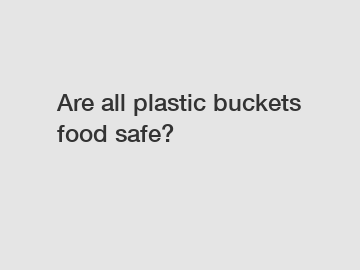Are all plastic buckets food safe?
Are All Plastic Buckets Food Safe?
Plastic buckets are commonly used for various purposes, from storing household items to holding chemicals and even for food storage. However, when it comes to using plastic buckets for storing food, there arises a concern about their safety. Are all plastic buckets food safe? Let's delve deeper into this topic to understand the safety aspects associated with plastic buckets and their suitability for storing food.
Types of Plastic Buckets.

There are different types of plastics used in the manufacturing of buckets. Each type has a unique combination of properties that makes it suitable for specific applications. In terms of food safety, two commonly used plastics for buckets are high-density polyethylene (HDPE) and polypropylene (PP).
High-Density Polyethylene (HDPE).
HDPE is a widely used plastic known for its strength, durability, and resistance to chemicals. It is commonly used for food containers, including buckets, due to its favorable properties. HDPE plastic buckets are considered food safe as they are resistant to chemicals, heat, and moisture, providing a secure environment for food storage.
Polypropylene (PP).
Polypropylene is another popular plastic used for food containers. It is known for its high melting point, which makes it suitable for storing hot liquids or food items. PP plastic buckets are also considered food safe as they are resistant to chemicals and have good heat resistance properties.
Factors Affecting Food Safety.
While HDPE and PP plastic buckets are generally considered safe for food storage, other factors may affect their food safety properties.
1. BPA Content: Bisphenol A (BPA) is a chemical that was previously found in some plastics and has raised concerns due to its potential health effects. However, most food-grade plastic buckets today are BPA-free, ensuring minimal health risks.
2. UV Exposure: Direct exposure to sunlight or prolonged exposure to UV radiation can degrade plastics, potentially impacting their safety and stability. It is advisable to store plastic buckets in a cool and dark place to minimize the effects of UV radiation.
3. Scratches: Scratches on the surface of plastic buckets can provide a breeding ground for bacteria and other contaminants. It is essential to clean and sanitize plastic buckets regularly to prevent the growth of harmful microorganisms.
Guidelines for Food Storage.
To ensure food safety when using plastic buckets for storing food, it is necessary to follow some guidelines:
1. Choose Food-Grade Buckets: Always select buckets specifically designed for food storage, preferably made from HDPE or PP plastics. Look for labels or symbols indicating food-grade quality.
2. Wash Thoroughly: Before using a new plastic bucket for food storage, wash it thoroughly with warm soapy water to remove any potential contaminants. Repeat this process regularly to maintain cleanliness.
3. Avoid High Temperatures: Plastic can melt or release harmful chemicals when exposed to high temperatures. Avoid using plastic buckets for storing extremely hot food or placing them in direct contact with heat sources, such as ovens or stovetops.
Conclusion.
In conclusion, not all plastic buckets are food safe. However, plastic buckets made from high-density polyethylene (HDPE) and polypropylene (PP) are generally considered safe for storing food. It is crucial to choose food-grade buckets, wash them thoroughly, avoid high temperatures, and store them properly to ensure food safety. By following these guidelines, you can safely use plastic buckets for food storage without compromising your well-being.
If you have any further questions or concerns about using plastic buckets for food storage, please do not hesitate to contact us.
For more 700ml IML Plastic Container, IML dips and sauce packaging, ice cream container in 2L volumeinformation, please contact us. We will provide professional answers.


